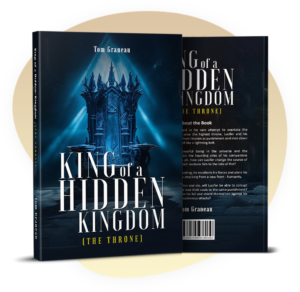The concept of Hell has long been debated—Is it a place of divine punishment, or is it simply the natural consequence of rebellion against God? In King of a Hidden Kingdom: THE THRONE by Tom Graneau, Hell is more than just a realm of suffering; it is a kingdom shaped by the choices of those who inhabit it. Lucifer and his followers are not merely cast down—they are placed in a space that reflects their own spiritual exile. This article examines whether Hell serves as retribution or as an inevitable result of rejecting divine order.

Hell as a Construct of Rebellion
In King of a Hidden Kingdom, Hell is not just a pit of fire and torment but a structured realm with cities, leaders, and a throne. It exists because of Lucifer’s rebellion, yet it also serves as a prison for those who defied God. Unlike Heaven, where divine order is upheld through harmony and love, Hell is a realm shaped by disobedience and suffering.
Lucifer does not simply accept his punishment—he transforms Hell into a fortress. He establishes his throne, divides the realm into regions, and prepares for an ongoing war against Heaven. However, no matter how much power he amasses, he remains bound within Hell’s limitations. His suffering is not just inflicted upon him; it is something he perpetuates by refusing to submit to God’s authority.
This suggests that Hell is not just a punishment enforced by God but the direct outcome of Lucifer’s choices. He creates his own torment by clinging to pride and resentment.
The Role of Human Souls in Hell’s Purpose
As King of a Hidden Kingdom describes, Hell is not only meant for fallen angels but also for human souls who reject God. The cities of Hell are divided based on different sins, reinforcing the idea that punishment is not arbitrary but tied to the moral choices of individuals.
One of the most haunting aspects of Hell is its Bottomless Pit—a realm where some of the worst fallen angels are imprisoned, constantly screaming in torment. This endless suffering suggests that those in Hell are not merely being punished but are experiencing the full consequences of separating themselves from God. They are trapped in a state of suffering because they have rejected the source of all goodness.
Divine Justice or Self-Inflicted Fate?
Theologically, Hell can be seen in two ways:
- As a divine punishment—God, in His justice, assigns punishment to those who rebel against Him. Lucifer and his angels are cast down, and sinful souls are condemned based on their actions.
- As a self-inflicted consequence—Lucifer and the damned choose separation from God, and Hell is the natural state of existence apart from Him.
King of a Hidden Kingdom leans heavily toward the latter interpretation. Lucifer’s suffering is largely psychological—his greatest torment is knowing he will never regain his former glory. His throne is not a prize but a cruel reminder of what he lost.
For human souls, Hell is not merely a place God sends them—it is the final result of rejecting divine grace. Those who find themselves in its grasp are not simply punished but are living out the inevitable consequence of their decisions.
Hell as a Reflection of Choice
In King of a Hidden Kingdom, Hell is both a punishment and a consequence. It exists because of rebellion, yet it is sustained by the choices of those within it. Lucifer does not have to remain in torment—he could, in theory, repent. However, his pride prevents him from doing so, making his suffering eternal.
For humans, Hell is not just a place of torment but a manifestation of their decision to turn away from God. Rather than being sentenced without cause, souls end up in Hell because they have actively separated themselves from the divine.
Ultimately, Hell in King of a Hidden Kingdom serves as a profound reminder that choices have consequences. Those who reject light are left with darkness—not because God forces it upon them, but because they have chosen it for themselves.